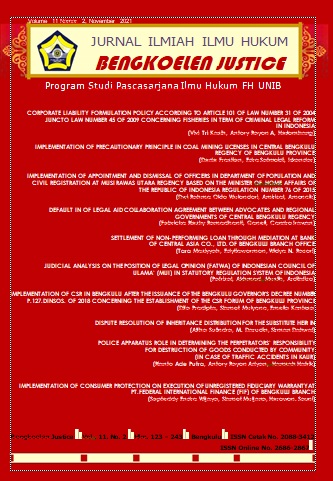Main Article Content
Abstract
The purpose of this research is to investigate, understand, describe, analyze and get a picture of the legal position of MUI fatwas in the statutory regulation system in Indonesia based on Law No. 12 of 2011 on Making Rules and Hierarchy of Rules. The method used in this research is normative. The results show that MUI fatwas are not included in positive law and don't have permanent legal power based on Law No. 15 of 2019 on the Amendment to Law Number 12 of 2011 on Making Rules and Hierarchy of Rules, so it cannot be legally applied to all Indonesian people. Also, fatwas of MUI cannot be a legal instrument to enforce legal act or to become the basis for imposing criminal sanctions for those who violate the law. It can only become positive law if the substance is stipulated by the authorized state institutions into laws and regulations as it is outlined in Law No. 15 of 2019 on the Amendment to Law No.12 of 2011 on Making Rules and Hierarchy of Rules.
Keywords
Article Details
References
- Books
- Ahmad Redi, Hukum Pembentukan Peraturan Perundang-Undangan, Sinar Grafika, Jakarta, 2018
- Amrullah Ahmad, Dimensi Hukum Islam Dalam Sistem Hukum Nasional, Gema Insani Pers, Jakarta, 1996
- Ahyar A. Gayo,” Kedudukan Fatwa MUI Dalam Upaya Mendorong Pelaksanaan Ekonomi Syariah”, Penelitian Hukum Badan Pembinaan Hukum Nasional Kementerian Hukum Dan HAM Ri, 2011
- A. Rosyid Al Atok, Konsep Pembentukan Peraturan Perundang-Undangan, Setara Pers, Malang, 2015,
- Bagir manan, Dasar-Dasar Perundang-Undangan Indonesia, Ind-Hill-Co, Jakarta, 1992
- Jimly Asshiddiqie, Perihal Undang-Undang, PT RajaGrafindo Persada, Depok, 2017
- Ma’ruf Amin, dkk, Himpunan Fatwa Majelis Ulama Indonesia Sejak 1975, Erlangga, Jakarta, 2011
- Mukhlis Taib, Dinamika Perundang-undangan Di Indonesia, Refika Aditama, Bandung, 2017,
- Putera Astomo, ilmu Perundang-Undangan Teori Dan Praktek Di Indonesia, PT RajaGrafindo Persada, Depo, 2018
- Rachmat Trijono, Dasar-Dasar Ilmu Pengetahuan Perundang-Undangan, Papas Sinar Sinanti, Jakarta, 2014
- Soimin, Pembentukan Perundang-Undangan Negara Di Indonesia, UII PERS, Yogyakarta, 2010,
- Yusuf Qardhawi, Fatwa Antara Ketelitian Dan Kecerobohan, Gema Insani Press, Jakarta, 1997
- Erfan Riadi, Kedudukan Fatwa Ditinjau Dari Hukum Islam Dan Hukum Positif (Analisis Yuridis Normatif),
- Journals
- Jurnal Hukum http://ejournal.umm.ac.id/index.php/ulum/article/viewFile/1305/1398, retrieved on 20th of January 2019
- Isa Ansori, Kedudukan Fatwa Di Beberapa Negara Muslim (Malaysia, Brunei Darussalam Dan Mesir), Jurnal hukum, http://ejournal.radenintan.ac.id/index.php/analisis/article/view/1790, retrieved on 10th of October 2019 at 1 PM
- Noname Kedudukan Lembaga Fatwa Mesir” http://dar-alifta.org/Module. aspx?Name=aboutdar (retrieved on 10th of October 2019)
- Sirman Dahwal, Pelaksanaan Perkawinan Beda Agama (Studi Berbagai Kasus Di Indonesia Priode Tahun 1986-2010), Jurnal Ilmu Hukum Bengkoelen Justice, Program Pasca Sarjana Ilmu Hukum vol.2.No.2.2012, p.464-465.
References
Books
Ahmad Redi, Hukum Pembentukan Peraturan Perundang-Undangan, Sinar Grafika, Jakarta, 2018
Amrullah Ahmad, Dimensi Hukum Islam Dalam Sistem Hukum Nasional, Gema Insani Pers, Jakarta, 1996
Ahyar A. Gayo,” Kedudukan Fatwa MUI Dalam Upaya Mendorong Pelaksanaan Ekonomi Syariah”, Penelitian Hukum Badan Pembinaan Hukum Nasional Kementerian Hukum Dan HAM Ri, 2011
A. Rosyid Al Atok, Konsep Pembentukan Peraturan Perundang-Undangan, Setara Pers, Malang, 2015,
Bagir manan, Dasar-Dasar Perundang-Undangan Indonesia, Ind-Hill-Co, Jakarta, 1992
Jimly Asshiddiqie, Perihal Undang-Undang, PT RajaGrafindo Persada, Depok, 2017
Ma’ruf Amin, dkk, Himpunan Fatwa Majelis Ulama Indonesia Sejak 1975, Erlangga, Jakarta, 2011
Mukhlis Taib, Dinamika Perundang-undangan Di Indonesia, Refika Aditama, Bandung, 2017,
Putera Astomo, ilmu Perundang-Undangan Teori Dan Praktek Di Indonesia, PT RajaGrafindo Persada, Depo, 2018
Rachmat Trijono, Dasar-Dasar Ilmu Pengetahuan Perundang-Undangan, Papas Sinar Sinanti, Jakarta, 2014
Soimin, Pembentukan Perundang-Undangan Negara Di Indonesia, UII PERS, Yogyakarta, 2010,
Yusuf Qardhawi, Fatwa Antara Ketelitian Dan Kecerobohan, Gema Insani Press, Jakarta, 1997
Erfan Riadi, Kedudukan Fatwa Ditinjau Dari Hukum Islam Dan Hukum Positif (Analisis Yuridis Normatif),
Journals
Jurnal Hukum http://ejournal.umm.ac.id/index.php/ulum/article/viewFile/1305/1398, retrieved on 20th of January 2019
Isa Ansori, Kedudukan Fatwa Di Beberapa Negara Muslim (Malaysia, Brunei Darussalam Dan Mesir), Jurnal hukum, http://ejournal.radenintan.ac.id/index.php/analisis/article/view/1790, retrieved on 10th of October 2019 at 1 PM
Noname Kedudukan Lembaga Fatwa Mesir” http://dar-alifta.org/Module. aspx?Name=aboutdar (retrieved on 10th of October 2019)
Sirman Dahwal, Pelaksanaan Perkawinan Beda Agama (Studi Berbagai Kasus Di Indonesia Priode Tahun 1986-2010), Jurnal Ilmu Hukum Bengkoelen Justice, Program Pasca Sarjana Ilmu Hukum vol.2.No.2.2012, p.464-465.

